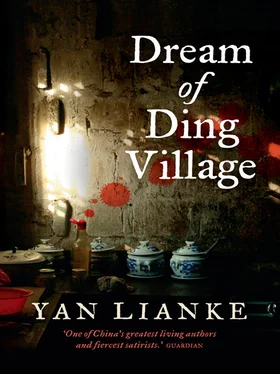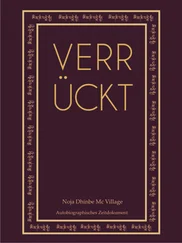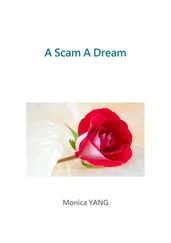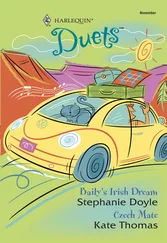Grandpa was about to head back to the well for more water when he saw Ding Yuejin, the last to leave, trudging through the gate with his luggage.
‘Hi, Uncle. Watering your garden?’
Grandpa decided to skip the small talk. ‘When your cousin Liang’s grave was robbed, I didn’t raise a fuss in the village. I never said a single word. What more do you people want from me? Are you trying to drive me to my death?’
Ding Yuejin, now standing face to face with Grandpa, set down his luggage and thought for a moment.
‘Ding Liang was a good man,’ he said slowly. ‘But that brother of his is another story. First he steals our coffins, then he cancels our food subsidy. What makes him think we had anything to do with robbing his brother’s grave? But even if we did, that doesn’t change a thing. It doesn’t mean Ding Hui is a good man.’
Ding Yuejin squinted at Grandpa through the bright sunshine. ‘Do you know what he’s doing now? He’s arranging marriages for people who died of the fever. First they put him in charge of coffins and food subsidies, and now he’s the matchmaker for every dead person in the county! I hear he gets 200 yuan for every match he makes. Just think about all the people who have the fever, and about all the boys and girls who’ll die before they can get married. Can you imagine how much money he stands to make, before this is all over? It should have been Ding Hui who died, not his brother.’
Ding Yuejin picked up his luggage, brushed past Grandpa and began walking towards the village. As Grandpa watched him leave, it dawned on him why the residents of the school had been so hostile, and why they had given him such dirty looks. Dropping his buckets and shoulder pole, Grandpa raced after his nephew, shouting: ‘Yuejin! Yuejin! Was it true, what you said?’
Ding Yuejin turned around. ‘If you don’t believe me, go and ask him yourself!’
He continued on his way, leaving Grandpa standing in the middle of the road beneath the blazing sunshine, like a small clay figure of a man that someone had left to dry in the sun. Like an old wooden hitching post bleached by the sunshine, a piece of rotting wood that no one wanted any more.
3
Although Grandpa kept meaning to go into the city and visit my parents and sister, he never did. He couldn’t seem to bring himself to make the trip. Then again, maybe he just didn’t want to face my dad.
Instead, he spent his days in the elementary school. The school was deserted now, and the classrooms were bare. The desks, chairs and blackboards were gone. The tables and wooden planks that had served as beds were also missing, carted off by the former residents. Every tree in the schoolyard, from the biggest to the smallest, had been chopped down. The villagers had even taken the windowpanes.
Not a day went by without someone showing up with a letter authorizing them to remove certain items from the school. The letters always bore the official village seal and the signatures of Jia Genzhu and Ding Yuejin. When everything had been taken, Grandpa found himself the caretaker of an empty schoolhouse, a deserted schoolyard and his own two small rooms. With nothing to watch over and nothing left to do, Grandpa got bored. He talked about visiting my dad in the city, but somehow, he never did. The days were as empty as his heart, which seemed to have left his body, in the same way that his youngest son had left this life. It felt like everything he’d ever loved had died. Although my dad was still alive and well and living comfortably in the big city, it made no difference to Grandpa. In his mind, his eldest son was already dead.
He felt the same way about Ding Village.
For him, the village had ceased to exist.
With no desire to see any of the villagers, Grandpa spent his days in the elementary school. The school was as empty and silent as it had been a year ago. All the people were gone. There were no teachers or students or sick residents. The two-acre campus held but one living soul. Now that Grandpa was alone, he could go to bed as early as he liked and sleep as late as he wanted. He could eat when he was hungry, drink when he was thirsty, empty his bowl or leave leftovers, to stretch one meal into two. And if he didn’t bother to wash the pot he’d cooked in, who cared? No one would ever know. What did it matter if his face was unwashed? No one would ever see it.
The idleness began to weigh on him. Grandpa felt as if he were living on the fringes of the world, rather than inside it. Every so often, cries and wailing from the village informed him that someone else had died, but he never bothered to find out who it might be. What concern was it of his, if another person vanished from this world?
When he saw a funeral procession leaving the village or passing by the school, he would stand and watch for a few moments before returning to whatever he’d been doing.
Not that there was anything to do but weed and water his garden, or stand and watch it grow. When he had rid his tiny plot of weeds and pests, the only thing left was to wait for more to appear.
Although drought had reduced the plain to ashes, turning the soil a feathery grey, here was a small oasis of green. Grandpa guarded his vegetable patch as carefully as he would his own life. Uncle and Lingling were dead. Tingting and Little Jun had left. My dad had moved to the city, taking his wife and daughter with him. Grandpa had no family left in Ding Village. But when he thought about his broken family, he didn’t feel particularly sad. He felt cleaner somehow, lighter, as if a burden he’d borne for decades had been lifted from his shoulders.
The days went by, each one much the same. As summer reached its peak and the trees shed their remaining leaves, Jia Genzhu showed up at the school gate. He stood silently, watching Grandpa catch insects in his garden, and then said, in a small voice: ‘Hello, Uncle.’
Grandpa wheeled around, startled. What he saw was even more startling. It had been more than a fortnight since Grandpa had gone into the village, and a little more than three weeks since the sick villagers had moved out of the school. That was the last time he had seen Jia Genzhu, on the day he and the others had left. But the man squatting by Grandpa’s garden was not the Jia Genzhu he had known. This person was so emaciated he hardly seemed human. His face was sickly, and there were dark circles under his eyes. His eyes were so shrunken you could place an egg, or maybe a fist, in each socket. Crouched in the shade of the schoolyard wall, not far from my grave, he looked like a phantom, a spirit risen from the ground. His skin was desiccated, like he’d been left out in the sun and wind too long.
Genzhu, who had never called my grandpa ‘uncle’ in his life, seemed embarrassed by the endearment. His face cracked into an awkward smile.
‘What’s wrong with you?’ Grandpa asked.
‘I’m dying.’ Genzhu’s smile grew as thick as tree bark. It seemed too heavy for his face, like it might peel away at any moment. ‘I doubt I’ll live more than a few days. Since I’ve got no future anyway, I thought I might as well come and have a talk with you.’
Grandpa left his vegetable patch and sat down at the foot of my grave. When he was settled on the ground, six feet above where I lay, he turned to Genzhu with a serious let’s-have-that-talk expression. It was just before sunset, and the heat was rolling off the plain. The evening humidity was seeping in. Sitting in the shade of the schoolyard wall, with a slight breeze cooling their skin, Grandpa and Genzhu felt almost comfortable.
A concert of cicadas buzzing in the distance made Grandpa think of Ma Xianglin playing on his fiddle. It had been almost a year since the musician had died, a year since his performance the previous autumn.
Читать дальше












